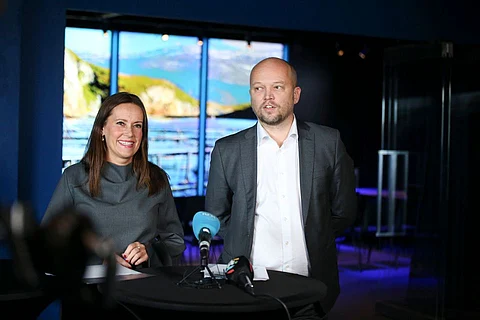

Marianne Sivertsen Næss, Norway’s Minister of Fisheries and Oceans, and Finance Minister Trygve Slagsvold Vedum.
Photo: Norwegian Ministry of Fisheries and Oceans.
Norway's relationship with the European Union has hit the headlines this week, with the news that the Norwegian government coalition has split due to disagreements on the implementation of three directives from the EU's fourth energy package, aimed at expanding renewable energy and improving energy efficiency.
The coalition, between Norway's centre-left Labour Party (Ap) and the eurosceptic Centre Party (Sp), has been under tension for some time regarding the issue. Finance Minister and Centre Party politician Trygve Slagsvold Vedum, who was often the public face of Norway's controversial ground rent tax on aquaculture, confirmed his party would be withdrawing from the coalition on Thursday.
The Labour party will continue as a minority government, led by Prime Minister Jonas Gahr Støre, with the next parliamentary elections due on 8 September.
Norway's energy policy must align with EU regulations in order for it to access the EU single market for energy exports, as part of the European Economic Area (EEA) trade agreement.
The EU is Norway's biggest export market: 67.5% of all Norwegian exports are destined for the bloc, with energy the top export, as one of the EU's main suppliers of oil, gas and electricity.
Norway's second largest export category to the EU is seafood, exporting an average of 1.3 million tonnes of fishery and aquaculture products to the bloc in the years 2021-2023, vallued at EUR 7.8 billion, according to figures from the EU Market Advisory Council.
In an opinion piece for Norwegian newspaper VG published earlier this week, Geir Ove Ystmark, CEO of Norwegian Seafood Federation Sjømat Norge, argued that the Centre Party's stance was "undermining cooperation with our most important trading partners", and warned that a lack of cooperation on energy policy could have serious knock-on effects on Norway's seafood trade, particularly given uncertainties over forthcoming US trade policies and tariffs.
He wrote that the lack of follow-through from Norway on the energy directive could mean the EU may be less willing to "shield Norway from protectionist measures", warning that this could be "disastrous" for Norway's seafood sector.
Sjømat Norge has previously indicated it sees cooperation with the EU as vital for Norwegian seafood. In December, Ystmark met with the Norwegian Confederation of Food and Drink to discuss Norway's approach to EU regulations on food. "Norway must take an even more active role vis-à-vis the EU so that EU regulations are adapted to Norwegian conditions," Sjømat Norge stated at the time.
